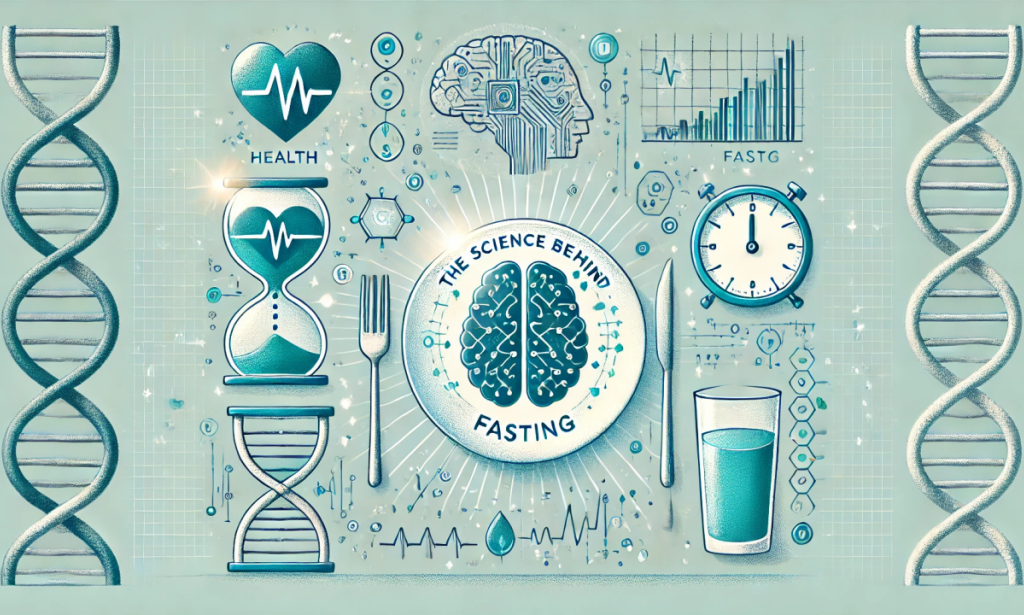INTRODUCTION:
Fasting has become increasingly popular in recent years as a strategy for improving overall health, promoting weight loss, and boosting longevity. While many people may be familiar with the concept of fasting, its science and the ways it can impact your health journey are often misunderstood. This article will delve into the science behind fasting, explain its health benefits, and explore the different types of fasting to help you understand how it can be a powerful tool in your wellness journey.

What is Fasting?
Fasting involves abstaining from food or reducing caloric intake for a specific period. The length and structure of the fast can vary based on the fasting method being used. While fasting has been practiced for centuries for spiritual, religious, or therapeutic reasons, recent scientific research has highlighted its potential benefits for health and longevity.
Fasting is not just about skipping meals; it's a physiological process that can trigger significant changes in the body. When we fast, our body undergoes several metabolic shifts that can have profound effects on health. These changes are key to understanding how fasting can contribute to a healthier, longer life.
The Science Behind Fasting: How It Affects Your Body
- Metabolic Switch: From Glucose to Ketones
When you eat food, your body primarily relies on glucose (sugar) from carbohydrates as its main source of energy. However, during fasting, when glucose is not available, your body switches to an alternative fuel source—ketones. Ketones are produced from stored fat and serve as an efficient energy source for the brain and other tissues during periods of food deprivation. This process is known as ketosis, and it is one of the key metabolic changes that occur during fasting.
- Autophagy: Cellular "Housekeeping"
Autophagy is the process by which your body cleans out damaged or dysfunctional cells, proteins, and organelles. When you fast, the reduction in nutrients and energy signals your body to start this process of cellular repair. Studies suggest that fasting can stimulate autophagy, leading to the regeneration of healthy cells, improved tissue function, and even the prevention of diseases such as cancer and Alzheimer's disease.
- Insulin Sensitivity and Blood Sugar Regulation
One of the major benefits of fasting is improved insulin sensitivity. Insulin is a hormone that helps regulate blood sugar levels. Frequent eating, especially of high-carb foods, can lead to insulin resistance, a condition where the body becomes less responsive to insulin. This can eventually lead to type 2 diabetes. During fasting, insulin levels drop, which improves insulin sensitivity and reduces the risk of developing chronic diseases related to poor blood sugar regulation.
- Reduction in Inflammation
Chronic inflammation is linked to numerous health issues, including heart disease, diabetes, and autoimmune disorders. Fasting has been shown to reduce markers of inflammation in the body. By decreasing the frequency of meals and allowing the body to rest from constant digestion, fasting helps to reduce oxidative stress and inflammation, leading to improved immune function and overall health.
- Hormonal Changes: Growth Hormone and Fat Loss
Fasting also triggers the release of growth hormone (GH), a vital hormone for muscle growth, fat loss, and cellular regeneration. Studies have shown that fasting can increase GH secretion, which helps preserve lean muscle mass while promoting fat burning. As a result, fasting may aid in weight management by reducing body fat while maintaining muscle tissue.
- Longevity and Disease Prevention
One of the most exciting aspects of fasting research is its potential to increase lifespan. Animal studies have shown that caloric restriction (a form of fasting) can extend life expectancy by slowing down the aging process and improving the body’s ability to fight age-related diseases. In humans, intermittent fasting and calorie restriction have been associated with improved cardiovascular health, brain function, and a reduced risk of chronic conditions like cancer and neurodegenerative diseases.

Different Types of Fasting
There are several different types of fasting, each with its own approach and benefits. The key to success is choosing the fasting method that best fits your lifestyle and goals.
-
Intermittent Fasting (IF): Intermittent fasting is one of the most popular fasting methods. It involves cycling between periods of eating and fasting. The most common approach is the 16/8 method, where you fast for 16 hours and eat within an 8-hour window. Other variations include the 5:2 method (eating normally for five days of the week and fasting for two non-consecutive days) and alternate-day fasting.
-
Time-Restricted Eating: This form of fasting restricts eating to specific hours each day. For example, you may only eat between 12:00 pm and 6:00 pm, fasting for the remaining hours. This approach helps regulate eating habits and supports metabolic health.
-
Extended Fasting: Extended fasting involves abstaining from food for more than 24 hours, typically lasting anywhere from 48 hours to several days. This method should be done with caution and under medical supervision, as it can significantly affect metabolism and hydration.
-
Alternate-Day Fasting: This fasting approach alternates between days of normal eating and fasting. On fasting days, calorie intake is usually reduced to 500-600 calories, while normal eating occurs on non-fasting days.
Health Benefits of Fasting
-
Weight Loss: Fasting can lead to weight loss by reducing overall calorie intake and increasing fat burning. The shift from glucose to fat as the primary fuel source supports fat loss while maintaining muscle mass.
-
Improved Heart Health: Fasting has been linked to lower blood pressure, reduced cholesterol levels, and a lower risk of heart disease.
-
Better Brain Function: Fasting stimulates brain-derived neurotrophic factor (BDNF), a protein that supports brain health and the growth of new neurons. This can enhance cognitive function and may reduce the risk of neurodegenerative diseases.
-
Reduced Risk of Chronic Diseases: Regular fasting has been associated with a reduced risk of developing chronic diseases such as type 2 diabetes, heart disease, and cancer.
Considerations and Safety Tips
While fasting offers many health benefits, it’s important to approach it with care:
-
Consult with a Healthcare Professional: Before beginning any fasting regimen, especially extended fasting, consult with a healthcare provider, particularly if you have underlying health conditions like diabetes, heart disease, or eating disorders.
-
Stay Hydrated: Drinking plenty of water during fasting is essential for preventing dehydration and supporting bodily functions.
-
Listen to Your Body: Fasting should not cause excessive fatigue, dizziness, or other adverse symptoms. If you experience these, it's important to stop fasting and reassess your approach.
Conclusion
Fasting, when done correctly, offers numerous benefits for your health journey, including weight loss, improved metabolic function, enhanced cellular repair, and even longevity. Understanding the science behind fasting allows you to make informed decisions about which fasting method may work best for you. Whether you choose intermittent fasting, time-restricted eating, or other forms of fasting, incorporating it into your lifestyle can lead to significant health improvements. However, it’s important to approach fasting with a well-thought-out plan and, if necessary, under medical guidance to ensure it aligns with your overall health and wellness goals.



You must be logged in to post a comment.